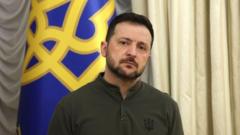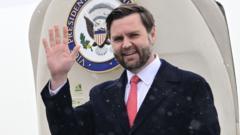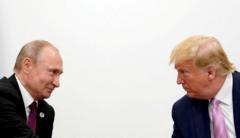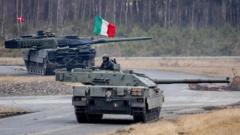Amidst fears that U.S.-Russia discussions may bypass Ukraine, military support allies assert Kyiv’s essential role in any peace talks. The geopolitical landscape signals potential concessions from Ukraine while raising concerns about the ongoing conflict's just resolution.
Concerns Rise Over U.S.-Russia Talks as Ukraine Voices Fear of Exclusion

Concerns Rise Over U.S.-Russia Talks as Ukraine Voices Fear of Exclusion
As President Trump initiates talks with President Putin, Ukraine's allies stress the necessity of including Kyiv in any negotiations regarding the war's end.
In a NATO meeting held in Brussels, defense ministers from Ukraine's Western allies firmly rejected any peace negotiations with Russia that sideline Kyiv after renewed discussions between President Trump and President Vladimir Putin. Tensions rose with Trump characterizing his call with Putin as a step toward negotiations, but neither leader’s statements included Ukrainian President Volodymyr Zelensky, raising flags over U.S. support for Ukraine.
NATO Secretary General Mark Rutte reiterated the importance of Ukraine’s involvement in negotiations, stating, “It is crucial that Ukraine is closely involved in all talks on its future.” This sentiment echoed throughout the meeting as allies emphasized that discussions about Ukraine must include its officials to ensure the nation's voice is heard and represented.
Concerns about a softening U.S. stance towards Ukraine have given rise to fears that the Trump administration may press Kyiv into making unacceptable concessions. Defense Secretary Pete Hegseth’s recent remarks indicated a lack of U.S. support for Ukraine’s NATO aspirations and suggested that returning to Ukraine’s pre-2014 borders is “unrealistic.” This has sparked anxiety amongst Ukrainians who have fought hard to reclaim territories lost to Russian aggression.
On the ground in Kyiv, residents expressed mixed emotions of fear and cautious optimism regarding a potential peace process. “We want the fighting to end, but any peace must be just,” said one local, reflecting the broader sentiment that sacrifices made during the war should not be undermined. Many are concerned that U.S. negotiations could weaken their position, especially with Russia demanding concessions on Ukraine's territorial integrity.
Commentators noted that the U.S. and Russian dynamics may further shift in favor of Putin, especially with potential diplomatic efforts led by countries like Saudi Arabia. While some analysts worry that Trump’s outreach might bolster Russian leverage, others focused on the possibility of extracting Ukrainian mineral rights as a trade-off for continued U.S. military aid, albeit at a potentially steep price for Kyiv.
Meanwhile, markets reacted positively in Russia following news of the talks, signaling investor optimism regarding a possible easing of sanctions. This development raises apprehensions in Ukraine about the future of Western support and their place in negotiations as calls for peace become increasingly prominent.
In the lead-up to continued discussions at the Munich Security Conference, Zelensky faces mounting pressure to navigate the complex landscape formed by shifting U.S.-Russia relations and the need for Ukrainian interests to remain at the forefront. The Ukrainian president's dilemma now rests on building alliances with Western partners to ensure his nation’s security as peace talks loom.
NATO Secretary General Mark Rutte reiterated the importance of Ukraine’s involvement in negotiations, stating, “It is crucial that Ukraine is closely involved in all talks on its future.” This sentiment echoed throughout the meeting as allies emphasized that discussions about Ukraine must include its officials to ensure the nation's voice is heard and represented.
Concerns about a softening U.S. stance towards Ukraine have given rise to fears that the Trump administration may press Kyiv into making unacceptable concessions. Defense Secretary Pete Hegseth’s recent remarks indicated a lack of U.S. support for Ukraine’s NATO aspirations and suggested that returning to Ukraine’s pre-2014 borders is “unrealistic.” This has sparked anxiety amongst Ukrainians who have fought hard to reclaim territories lost to Russian aggression.
On the ground in Kyiv, residents expressed mixed emotions of fear and cautious optimism regarding a potential peace process. “We want the fighting to end, but any peace must be just,” said one local, reflecting the broader sentiment that sacrifices made during the war should not be undermined. Many are concerned that U.S. negotiations could weaken their position, especially with Russia demanding concessions on Ukraine's territorial integrity.
Commentators noted that the U.S. and Russian dynamics may further shift in favor of Putin, especially with potential diplomatic efforts led by countries like Saudi Arabia. While some analysts worry that Trump’s outreach might bolster Russian leverage, others focused on the possibility of extracting Ukrainian mineral rights as a trade-off for continued U.S. military aid, albeit at a potentially steep price for Kyiv.
Meanwhile, markets reacted positively in Russia following news of the talks, signaling investor optimism regarding a possible easing of sanctions. This development raises apprehensions in Ukraine about the future of Western support and their place in negotiations as calls for peace become increasingly prominent.
In the lead-up to continued discussions at the Munich Security Conference, Zelensky faces mounting pressure to navigate the complex landscape formed by shifting U.S.-Russia relations and the need for Ukrainian interests to remain at the forefront. The Ukrainian president's dilemma now rests on building alliances with Western partners to ensure his nation’s security as peace talks loom.






















